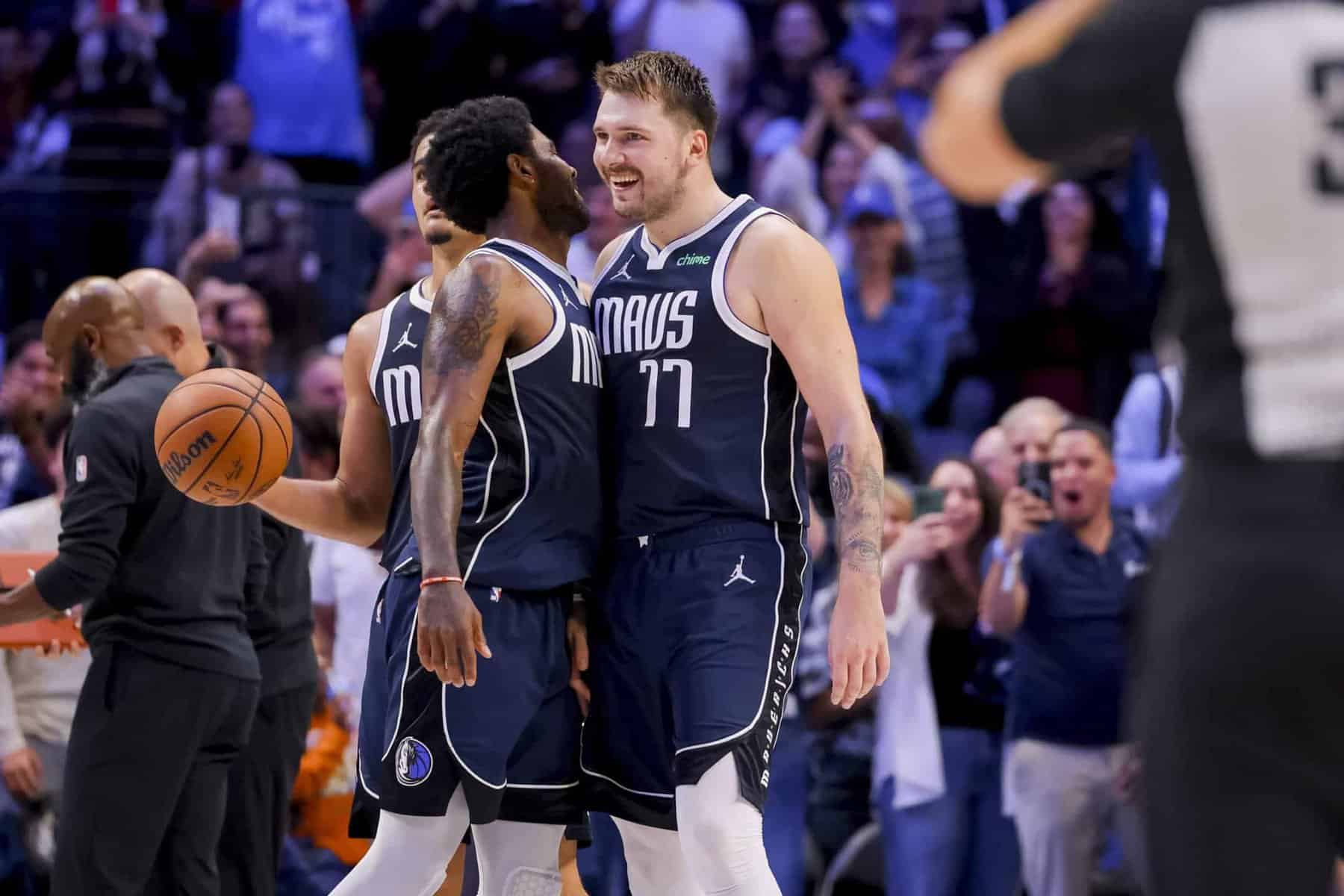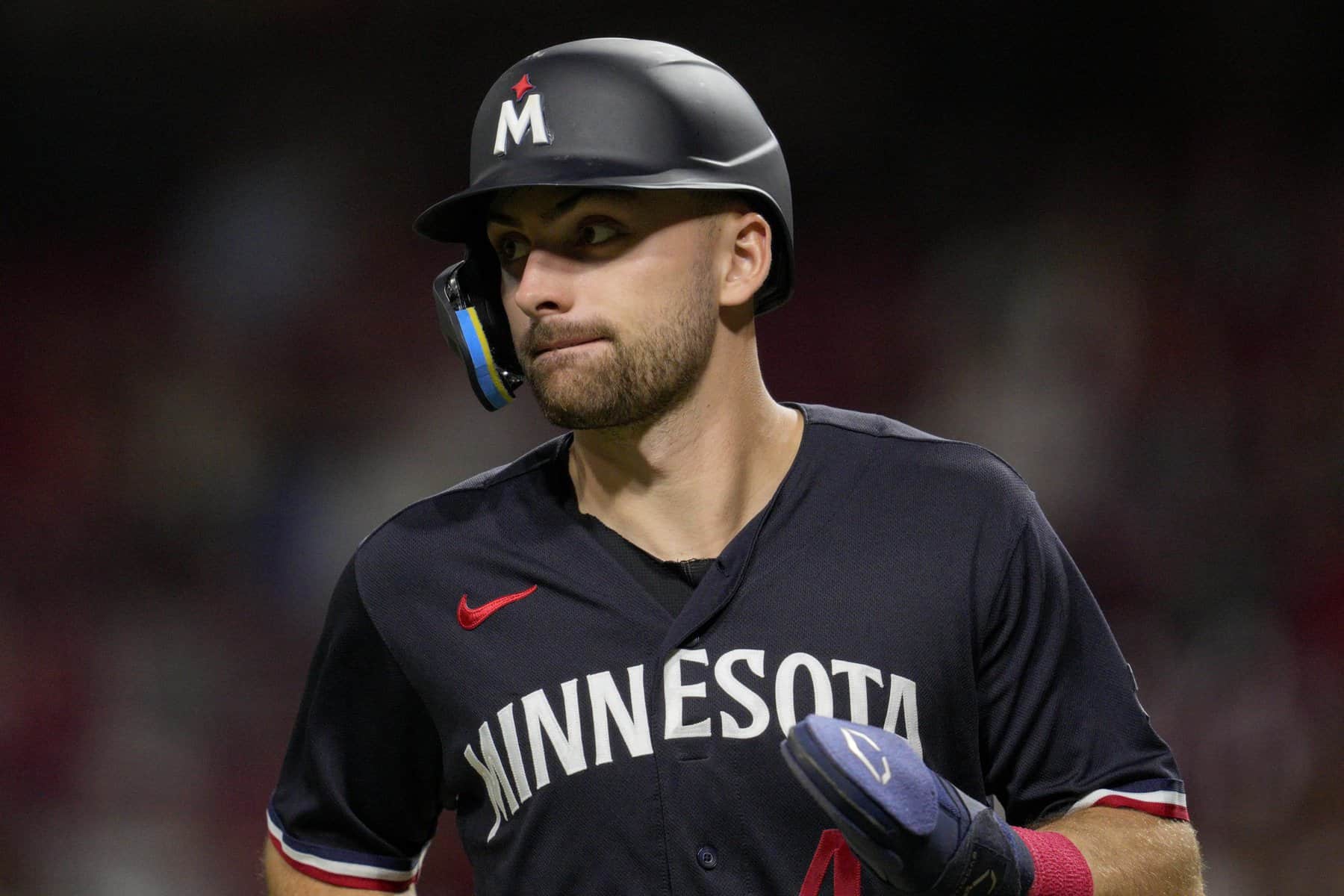Matt Gajewski’s new CFB DFS Picks article comes out every friday afternoon for you college football daily fantasy needs on DraftKings and more! And don’t forget to check out the College Football DFS and betting show every Saturday at 10 AM ET.
The Week 4 CFB DFS Picks Article with Matt Gajewski
Florida vs Ole Miss
Florida – (35.5 TT)
CFB DFS Analysis: Offense – Dan Mullen remains the head coach, but he promoted within at offensive coordinator this offseason. Brian Johnson will now coordinate the offense after serving as an offensive analyst. Florida runs a spread attack and they often put four-wide on the field. They ran 68.2 plays per game (93rd), with a 56.7-percent pass rate (12th). This offensive line struggled at times last year, but they return four of five starters and earned a transfer in Steward Reese from Mississippi State. He started multiple seasons there.
Kyle Trask ($7,200) – Trask took over for an injured Feleipe Franks midway through last year. He played well, with a 66.9 completion percentage, while averaging 8.3 yards per attempt. He is non-factor in the run game, with 8-total yards on the year. He remains an outside consideration here after he eclipsed the 300-yard bonus in four of ten starts last year.
Dameon Pierce ($5,900) – Pierce should fill in for Lamical Perine after his departure to the NFL. Pierce carried 54 times for 305 yards last year. He stands 5-10, 207-pounds, but likely cedes some work to change-of-pace backs Lorenzo Lingard and Malik Davis.
Kyle Pitts ($5,400) – Pitts plays tight end for Florida. He ranked second on the team with 649 receiving yards last year on 54 catches. Pitts is a massive 6-6, 239-pound play-maker for Florida.
Trevon Grimes ($5,400) – Grimes finished with 33 catches, for 491 yards last year in a rotational role. He largely plays on the outside. Grimes is 6-5, 214-pounds, with a verified 4.47 40-yard dash.
Jacob Copeland ($4,900) – Copeland should play on the outside opposite Grimes. He recorded 273 yards on 21 catches last year.
Kadarius Toney ($5,300) – Toney came to Florida as a gadget play and dealt with injuries last year. He only caught ten balls for 194 yards, but should play a larger role from the slot this year. Florida often gives him carries as well.
Justin Shorter (No Price) – Shorter is a former 5-star recruit for Penn State. He stands 6-4, 235-pounds and recently received immediate eligibility. He ran a 4.52 coming out of college. Shorter should mix in with Grimes.
Ole Miss – (21.5 TT)
CFB DFS Analysis: Offense – Lane Kiffin heads over to Ole Miss after coaching at FAU. At FAU, Kiffin’s offense ran 77.5 plays per game (11th) and passed 48.8-percent of the time (57th). Kiffin also hired Jeff Lebby as his offensive coordinator, who comes over from UCF. They run a similar offense in pace and pass rate. Ole Miss was set to return four of five starters on the offensive line, but center Eli Johnson opted out. Still Nick Broeker was a freshman all-American. New center Ben Brown didn’t allow a single QB pressure last year.
Matt Corral ($5,000) – Ole Miss will play both quarterbacks. Corral didn’t play well last year, with a 59-percent completion percentage and 7.7 yards per attempt. He averaged just 136.2 yards per game, while adding little with his legs. He has never thrown over 300 yards.
John Rhys Plumlee ($6,000) – Plumlee offers similar statistics as a quarterback, but he is an absolutely electric rusher. He led the team with 1,023 yards last year. He is a 6-0, 200-pound sophomore. Plumlee is worth a look in GPP’s with his rushing upside.
Jerrion Ealy ($5,500) – Ealy ranked second on Ole Miss in rushing last year, with 722 yards. He actually carried 21 fewer times than “starter” Scottie Phillips. Ealy is hurt by the presence of Rhys Plumlee. Both Henry Parris and Snoop Conner should mix into this backfield as well.
Henry Parrish ($3,000) – Parris is a 4-star incoming freshman, who stands around 5-10, 190-pounds. He was listed with the “or” next to Ealy. Both should see work.
Snoop Conner ($5,100) – Conner rushed for 512 yards on 81 carries, but he is parked down the depth chart.
Elijah Moore ($6,000) – Moore is the team’s leading receiving and he plays primarily from the slot. He caught 67 balls for 850 yards last year. Moore stands just 5-9, 185-pounds
Jonathan Mingo ($4,200) – Mingo remains a 2020 breakout candidate after recording 12 catches for 172 yards last year. He started 12 games last year and should become a bigger factor after entering the program as a 4-star. He is 6-2, 215-pounds
Dontario Drummond ($3,400) – Drummond projects as the third receiver. He only finished with 13 catches for 188 yards, as Ole Miss’ third-leading receiver. He is a former JUCO guy, who started 9 games for Miss last year.
Braylon Sanders ($4,500) – Sanders spent most of 2019 injured after notching 271 yards in 2018. He is listed as a backup but could rise up the depth chart.
Kenny Yeboah ($3,700) – Yeboah is a Temple transfer who recorded 19 catches for 233 yards and five scores last year. He is 6-4, 240-pounds.
Georgia Tech vs Syracuse
Georgia Tech – (30.25 TT)
CFB DFS Analysis: Offense – Geoff Collins remains the head coach of Georgia Tech after transitioning away from the triple option last year. Dave Patenaude is back after arguably the toughest job in college football. He was tasked with taking a triple option roster and molding it into a traditional offense. George Tech showed major improvements last week in this regard.
Last year, Georgia Tech threw the ball 40.3-percent of the time (102nd) and ran 63.0 plays per game (130th), which ranked dead last in football. So far this season, Georgia Tech is running 78 plays per game with a 46.2-percent pass rate. Their offensive line has held up and looks to be a strength moving forward. Here is their personnel. Right tackle is a Vanderbilt transfer, who made 32 starts in his career in Devin Cochran. Right guard is a Tennessee transfer in Ryan Johnson, who started 19 games. Center Kenny Cooper got hurt last year, but he started 19 games in his career at Georgia Tech. Left guard is Jack DeFoor, who started nine games last year. Left tackle Zach Quinney started 21 games in his career. We should continue to see improvements from this Georgia Tech team this year.
Jeff Sims ($6,300) – A freshman revelation for Georgia Tech, Sims remains too cheap after DraftKings failed to price him up. He currently averages 35.5 pass attempts per game, while adding 73 yards on the ground. This alone remains worth considering on the Week 4 College Football DFS slate.
Jahmyr Gibbs ($5,400) – Gibbs broke out in a major way with 15 carries for 75 yards, while notching 60 receiving yards on six targets in Week 3. He is 5-11, 201-pounds and remains the crown jewel of Georgia Tech’s recruiting class. He is a four-star prospect and the eighth-best running back in this class. He looks like a solid option with Jordan Mason expected to sit. Jordan Mason missed last week’s game, but he functioned as the starter prior to Week 3. He may have already lost his job to the highly talented Gibbs. Jamious Griffin functioned as a change of pace back to both players.
Jalen Camp ($4,500) – The current target leader, Jalen Camp only has 12 targets on the year. He also leads the team in routes run on 79.1% of Sims’ drop backs. This team spreads targets to so many pass catchers that Camp remains a mere dart throw.
Malachi Carters ($4,900) – Second on the team in targets, Malachi Carter only has ten targets.
Ahmarean Brown ($4,000) – After a solid freshman breakout, Ahmarean Brown remains lightly used through two games. With nine total targets and just 36 receiving yards, better days are ahead of the sophomore. Brown continues to run more routes than Carter (74.4% to 70.9%)
Syracuse – (22.25 TT)
CFB DFS Analysis: Offense – Dino Babers returns for his fifth season as head coach of Syracuse. Babers hired Sterlin Gilbert to coordinate the offense. Gilbert already has familiarity with Babers and runs the same veer-and-shoot offense that Syracuse is known for. Last year, Syracuse ran 80.5 plays per game (4th) and passed the ball 47.46-percent of the time (68th). Syracuse returns four offensive line starters after one of the worst performances in college football last year. This group allowed their quarterbacks to get sacked 40 times. So far, this group has been absolutely horrific with a 15.6-percent sack rate. Syracuse is still running 72.5 plays per game, with a 52.4% pass rate.
Tommy DeVito ($6,600) – There’s a good chance Rex Culpepper plays in this game. DeVito has only averaged 144 passing yards per game, while Syracuse’s offensive line continues to struggle with sacks. Neither quarterback looks viable in Week 4.
Jawhar Jordan ($4,900) – Jordan remains the leader of this backfield, out-carrying Markenzy Pierre 27-7 in the first two weeks. This has only amounted to 66 yards to Jordan, but he remains somewhat active in the pass game. He saw 3 targets in Week 2, but none in Week 3. Georgia Tech got steam-rolled by UCF after defending the run game well against Florida State. Jordan has been on the field for 72-percent of Syracuse’s running plays, and handled 58.7-percent of Syracuse’s carries. However, he isn’t a preferred play for DFS.
Taj Harris ($6,000) – Harris enter this contest with a 36.4% target share in Syracuse’s offense. Last week Harris’ targets dropped from 15-5, but he continues to run a route on almost every drop back. He remains the top receiving option here.
Anthony Queeley ($4,500) – Despite seeing five targets in back to back games, Anthony Queeley remains an outside consideration in Week 2. Queeley ran a route on 98% of Syracuse’s drop backs so far, easily pacing this team. While Nykeim Johnson ($4,000) and Courtney Jackson ($3,700) split time at the WR3, Queeley remains a locked in option within the offense.
Kansas State vs Oklahoma
Kansas State – (16.25 TT)
CFB DFS Analysis: Offense – Chris Klieman enters his second season as Kansas State’s head coach. Courtney Messingham is also entering his second season with the program as the offensive coordinator. Both coaches come from North Dakota State. Kansas State passed the ball 39.13-percent of the time last year (114th) and ran 65.2 plays per game (124th). This was one of the least exciting offenses in all of football last year. This offense also has major questions with five completely new starters on the offensive line. They still have Evan Curl, who was an All-Big 12 contributor. Josh Rivas also graded out really well on the offensive line. Kansas State played faster (71 plays) with more passing (45.1-percent) in Week 1 against Arkansas State. It looks like 2020 could be a rough year for Kansas State.
Skylar Thompson ($5,700) –One of the lowest implied team totals on the slate Kansas State’s entire offense looks avoidable. Skylar Thompson seldom eclipsed 30 pass attempts in 2019 and he began 2020 with a 28-attempt game. While Thompson offers some dual threat appeal, the lack of scoring upside renders him a complete dart throw.
Harry Trotter ($5,000) – Trotter played on 62-percent of Kansas State’s run plays. Trotter turned 16 carries into 43 yards, as Kansas State lost to Arkansas State. This equated to 47.1-percent of Kansas State’s carries. This is a situation to avoid.
Deuce Vaughn ($3,800) – Vaughn played on 44-percent of Kansas State’s run plays. Vaughn turned 12 carries into 47 yards. This equated to 35.3-percent of Kansas State’s carries.
Briley Moore ($3,800) – The wide receiver room remains tough to decipher after Wykeen Gill ($4,500) and a few other players missed Kansas States’ season debut. Moore plays the tight end position, but he led the group with six targets, while running a route on 68% of Thompson drop backs.
Chabastin Taylor ($4,700) – Taylor also recorded six targets and paced the wide receiver room with 98 yards. Taylor ran a route on 91% of Thompson drop backs. No other player appeared on more than 68%
Malik Knowles ($5,000) – Widely considered the WR1 entering the season, Knowles notched five targets for 27 receiving yards.
Wykeen Gill ($4,500) – Gill missed Week 1 with an injury.
Oklahoma – (44.25 TT)
Note – Oklahoma dealt with a Covid-19 outbreak prior to their season debut. It severely restricted their roster and caused the following players to miss the game – TJ Pledger, Rhamodre Stevenson, Obi Obialo, Drake Stoops, among other.
CFB DFS Analysis: Offense – Lincoln Riley remains one of the premier play callers in all of college football. Last year, he ran 69.2 plays per game (81st) and passed 41.6-percent of the time. They basically ran at these exact rates in their season debut.
Spencer Rattler ($8,200) – Largely untested, Spencer Rattler notched 290 passing yards on just 17 attempts in Oklahoma’s debut. Rattler also added a in a carry for ten yards, but Oklahoma kept the young quarterback in check due to their low-level competition. While Kansas State inspire fear, Rattler should at least play more of the game, putting him squarely in play this weekend.
TJ Pledger ($5,000) – Oklahoma named Pledger the starter prior to the season, but he missed Week 1. He looks like a solid option here after DraftKings priced him well below Marcus Major. This will be a time share to some degree.
Marcus Major ($6,900) – Oklahoma listed major second on the initial depth chart, but Pledger’s absence allowed him to receive 11 carries and 39% of the carries. He was listed with an “or” with Rhamondre Stevenson ($3,500).
Charleston Rambo ($7,800) – Oklahoma listed Rambo as their starting Z-receiver. He turned five targets into 80 yards on limited snaps in Oklahoma’s debut.
Theo Wease ($5,500) – Oklahoma listed Wease as their starting X-receiver with an “or” that included Theo Howard ($3,800) and Trejan Bridges ($4,100). Howard actually out-targeted Wease 4-3, but Bridges didn’t play due to covid protocols.
Obi Obialo ($4,700) – Oklahoma listed Obialo as their starting slot receiver, but he missed the game with a covid related absence. His backup Drake Stoops also missed the game. Both should play a larger role in Week 4.
Austin Stogner ($3,800) – Stogner remains Oklahoma’s starting tight end, but only saw two targets in the season opener.
Kentucky vs Auburn
Kentucky – (21 TT)
CFB DFS Analysis: Offense – Mark Stoops remains the head coach of Kentucky, with Eddie Gran in place as the offensive coordinator. Last year, Kentucky on threw 33.3-percent of the time, but they were using converted wide receiver Lynn Bowden at quarterback. They ran 65.8 plays per game (118th). Looking to 2018, Kentucky ran 65.4 plays per game (125th) and passed 37.6-percent of the time (118th). However, Kentucky returns four starting offensive linemen for a group that ranked second in the entire country in yards per carry. This team remains built to run the ball.
Terry Wilson ($5,300) – Terry Wilson suffered a season-ending injury in his second game last year. However, Wilson played extensively in 2018. He averaged only 20.6 pass attempts and 245.3 passing yards per game. However, Wilson remains one of the better dual threat quarterbacks on this slate. He rushed for 547 yards on 135 attempts in 2018. He has never passed for 300 yards and only eclipsed 200 two occasions in 2018. He has one 100-yard rushing game.
Asim Rose ($5,200) – Rose is listed as the clear starter here, with Rodriguez and Smoke listed with an “or” at backup. However, this backfield will remain a timeshare to some degree. It won’t matter as much as some other situations because Kentucky runs so much. Rose is the leading rusher among returners with 149 attempts for 826 yards last year (5.5 yards per carry). Rose is 6-1, 214-pounds. Rose also looks like the top pass catcher after recording 11 receptions.
Chris Rodriguez ($4,700) – Rodriguez rushed 71 times for 533 yards last year (7.5 yards per carry). Rodriguez is 5-11, 224-pounds.
Kavosiey Smoke ($4,800) – Smoke rushed 101 times for 616 yards last year (6.1 yards per carry). Smoke is 5-9, 201-pounds.
Josh Ali ($4,000) – Ali is listed as the starting Z-receiver. Ali recorded 23 catches for 233 yards last year on 45 targets. Ali stands 6-0, 193-pounds.
Justin Rigg ($3,700) – Rigg will start at tight end for Kentucky. He notched 11 receptions for 128 yards last year on 19 targets. Rigg stands 6-6, 263-pounds.
Clevan Thomas ($3,300) – Thomas should play the slot on one side. Thomas notched 11 catches for 99 yards on 16 targets. Thomas stands 5-11, 193-pounds.
Allen Dailey ($3,700) – Dailey should play the slot on the other side. Dailey notched seven receptions for 75 yards last year on 14 targets. Dailey stands 6-3, 208-pounds.
Bryce Oliver ($3,800) – Oliver is listed as Kentucky’s starting X-receiver. Oliver turned six receptions into 111 yards on 11 targets. Oliver stands 6-1, 215-pounds.
Kentucky plays excellent defense. Last year, they ranked No.2 in pass defense and No.14 in pass defense. They return eight starters this year and add promising transfer Kelvin Joseph from LSU. Joseph sat out last year due to transfer regulations.
Auburn – (28.5 TT)
CFB DFS Analysis: Offense – Gus Malzahn remains head coach of Auburn, but he named Chad Morris their new offensive coordinator. Morris coached Arkansas the last two season with limited success. Under Morris, Arkansas ran 65.7 plays per game (119th) and passed 53.9-percent of the time (24th). Auburn essentially replaces their entire offensive line and returns just one player with any starting experience.
Bo Nix ($7,300) – Nix had an up-and-down freshman year after winning Auburn’s starting quarterback job in camp. He completed just 57.6-percent of his passes for 195.5 passing yards per game. These struggled occurred on solid volume at 29 attempts per game. Nix offers some dual threat appeal with 313 yards on 97 attempts. Nix eclipsed 300 passing yards twice, but he failed to reach 200 yards in nine of his 13 games. He remains a low-upside option most weeks.
Shaun Shivers ($4,400) – Shivers is listed with an “or” next to DJ Williams and Tank Bigsby. Whitlow transferred this off-season, leaving a mess at running back. Shivers is a 5-7, 179-pound change of pace back. DJ Williams likely handles a bulk of the carries, with Shivers functioning as a change of pace.
DJ Williams ($5,800) – Williams carried 84 times for 400 yards last year and looks like more of the true rusher in this committee. Williams is a 5-10, 208-pound true sophomore. He is a former four-star prospect and the No.21 running back from 2019.
Tank Bigsby ($3,000) – Bigsby is a 6-0, 204-pound incoming freshman. Bigsby is a four-star prospect and the No.4 running back in the incoming 2020 recruiting class.
Seth Williams ($6,500) – Williams will play on the outside for Auburn. He led the Tigers with 59 catches and 830 yards on 101 targets. Williams stands 6-3, 211-pounds and ran a verified 4.53 40-yard dash coming out of high school. He is a future day two pick in the NFL Draft.
Anthony Schwartz ($5,000) – Schwartz notched 41 catches and 440 yards on 53 targets. Schwartz spent about half of his snaps in the slot last year. Schwartz stands 6-0, 179-pounds and clocked a verified 4.34 40-yard dash coming out of high school.
Eli Stove ($4,500) – Stove notched 37 catches and 321 yards on 54 targets. Stove spent about two-thirds of his snaps in the slot. Stove tore his ACL in the spring of 2019 and recovered enough to play a sizeable for Auburn last year. Stove is 6-0, 191-pounds.
Defense – Auburn also lost a ton of production of defense. Marlon Davidson and Derrick Brown both went to the NFL. KJ Britt is solid on the defensive line, but this group could still take a step back. They also lost all three starting corners, headlined by the departure of Noah Igbinoghene.
Louisville vs Pittsburgh
Louisville – (26.25 TT)
CFB DFS Analysis: Offense – Scott Satterfield enters his second season as head coach, along with offensive coordinator Dwayne Ledford. So far this year, they’ve run 80.5 plays per game with a 46.0-percent pass rate. They are a bit pass heavy after throwing just 37.7-percent of the time last year and running 70.9 plays per game.
Micale Cunningham ($8,400) – Highly efficient through two games, Louisville unleased Micale Cunningham for 35 pass attempts per game. This increased volume allowed Cunningham to average 325 passing yards, while adding 34 per game with his legs. Pittsburgh’s defense remains the strength of the team, making Cunningham less enticing. However, his upside in both phases keeps him in consideration.
Javian Hawkins ($6,700) – Hawkins has absurd carry counts on 18 and 27 in his first two games, handling 59% of the carries for Louisville. Hawkins has yet to find any involvement in the pass game with just 1 target. Louisville played in negative game script too (47-34 Miami game).
Hassan Hall ($3,800) – Behind Hawkins, Hall has carry-counts of six and nine. This equates to 21.1-percent of Louisville’s carries.
Justin Marshall ($3,700) – Listed as a starter, Marshall only has six target this year. He ran a route on 49% of Louisville’s drop backs so far, but he will split time with Braden Smith ($4,700), who quietly has ten targets on 39% of Cunningham’s drop backs.
Tutu Atwell ($7,500) – Atwell primarily plays the slot for Louisville, but he remains locked in as the team’s top pass catcher. Through two weeks, Atwell has a 29% target share.
Dez Fitzpatrick ($5,400) – Tied with Atwell at 18 targets, Dez Fitzpatrick also makes a solid stacking option with Cunningham. Fitzpatrick averages 92 receiving yards per game to Atwell’s 96.
Marshon Ford ($4,000) – Ford will play tight end for Louisville. While he only runs a route on 51% of Cunningham drop backs, his 10% target share keeps him in dart throw territory.
Pittsburgh – (29.25 TT)
CFB DFS Analysis: Offense – Pat Narduzzi remains the head coach of Pitt, with Mark Whipple entering his second season as offensive coordinator. Pitt ran an exciting offense with 75.3 plays per game (19th) and a 55.9-percent pass rate in 2019. They now get almost all of their offensive line back, which could help the run game. Through two games they’ve run 79 plays per game with a 49.4-percent pass rate. That likely increases against better competition, which they see here.
Kenny Pickett ($6,500) – Somewhat mobile, Kenny Pickett benefits from Pittsburgh’s pass heavy attack. While Pickett averages 28 attempts per game in 2020, his stats remain depressed after Austin Peay shortened quarters in the second-half of Pittsburgh’s season opener. Pickett remains a consideration based on volume alone.
Vincent Davis ($5,400) – Vincent Davis was named the starter for this Pitt team, but this will be a time share to some degree with AJ Davis ($4,100). Vincent has carried 11 & 18 times, while AJ has mixed in for 5 & 11. Vincent has also out-targeted AJ 3-2, making him the preferred back here. Pitt remains a team with a strong passing attack, but they come in as slight favorites here.
Taysir Mack ($5,500) – Mack missed Pitts’ first two games with injury, but he remains the team’s top pass catcher when healthy. Mack eclipsed 100 targets last year and should play a voluminous role within the offense when healthy. He remains a solid target here.
Jordan Addison ($6,100) – Addison primarily plays the slot for Pittsburgh. In Mack’s absence, Addison stepped up to handle a 28% target share in Pitts’ offense. He remains a consideration whether Mack plays or not.
Shocky Jacques-Louis ($4,700) – A disappointment to start the year. Jacques-Louis only has seven targets through two games.
Lucas Krull ($3,000) – After missing Week 1, Lucas Krull hit the field and saw five targets in Pitts’ second game. Krull ran a route on 73% of Pickett drop backs in his debut.
DJ Turner ($5,300) – Turner played an elevated role in Mack’s absence, but his return could push him to the bench. Turner could also push Jacques-Louis for snaps, making this a difficult spot to predict.
Texas vs Texas Tech
Texas – (44.25 TT)
CFB DFS Analysis: Offense – Tom Herman remains the head coach of Texas, but Mike Yurcich comes over as the offensive coordinator after coordinating Ohio State’s passing game last year. Under Yurcich, Ohio State ran 78.6 plays per game (7th) and passed 40-percent of the time. Sam Ehlinger isn’t Justin Fields, but he can offer some dual threat ability like Fields. So far this year, Texas is running 74 plays per game and passing 55.4-percent of the time. It remains difficult to gather anything from their season opener against UTEP, who they dismantled 59-3.
Sam Ehlinger ($8,900) – A solid dual threat, Sam Ehlinger notched 424 passing yards in his season debut. Texas Tech just allowed FCS quarterback Bailey Zappe to throw for 567 yards. Ehlinger has a case for top quarterback on the slate.
Keaontay Ingram ($6,100) – The Texas backfield will consist of an Ingram and Johnson committee. Bijan Robinson received five carries in Texas 59-3 win over UTEP, but he didn’t receive his first touch till Texas held a 21-0 lead. Ingram carried nine times for 44 yards and accounted for 29-percent of the team carries. Neither Ingram, nor Johnson, saw a target.
Roschon Johnson ($5,700) – Johnson actually received the first carry of the game and carried eight times in total. This accounted for 25.8-percent of Texas’ carries.
Joshua Moore ($7,100) – Texas listed Moore as the starting Z-receiver. He paced the team with eight targets in the season opener, but none of the receivers played a full compliment of snaps in Week 1.
Tarik Black ($6,200) – Texas listed Black as the starting X-Receiver. He received six targets in the opener, while running a route on 35% of Ehlinger drop backs.
Jake Smith ($6,500) – Smith missed last week with an injury, but Texas previously had him listed as the starting slot receiver. He looks questionable to miss again. Behind him, Brenden Schooler and Kai Money enter this picture with the “or” designation on the depth chart.
Cade Brewer ($4,100) – Brewer remains a low volume tight end in Texas’ offense.
Texas Tech (26.25 TT)
CFB DFS Analysis: Offense – Matt Wells remains head coach of Texas Tech and they will continue their pass heavy, up-tempo offense. Last year, they ran 77.7 plays per game and threw 57.4-percent of the time. That looks likely to continue this year, if the Houston Baptist game is any indication.
Alan Bowman ($7,000) – Throwing the ball 52 times in the season-opener, volume alone keeps Alan Bowman in the mix for Week 4. With an egregiously low-price tag, Bowman presents one of the top price-adjusted play on the entire slate.
SaRodorick Thompson ($7,000) – Legal troubles aside, it appears Thompson will play in this game against Texas. Thompson led this backfield with 22 carries and four targets in their debut against Houston Baptist. He notched an impressive 118 yards on carries alone, accounting for 53.7-percent of Texas Tech’s carries.
Xavier White ($4,200) – White remains the team’s second back, despite missing their season opener. Texas Tech listed White as the lone backup ahead of this contest.
Erik Ezukanma ($6,800) – Ezukanma will play the X for Texas Tech. He saw eight targets in the season opener, equating to a 16% target share.
TJ Vasher ($5,700) – Vasher will play the Z for Texas Tech. He actually paced the Red Raiders with ten targets in Week 1, notching 78 receiving yards.
Dalton Rigdon ($4,600) – Rigdon will play the slot for the Red Raiders. All three starting receivers ran a route on 67% of Bowman drop backs, making Rigdon the best price adjusted play here.
KeSean Carter ($4,300) – Carter received seven targets in the opener, but only ran a route on 33-percent of Bowman drop backs.
Mississippi State vs LSU
Mississippi State – (20.5 TT)
CFB DFS Analysis: Perhaps undergoing more drastic changes than any other program in the country, Mississippi State moves over to Mike Leach’s air raid system. Last year, Washington State passed 77.9-percent of the time (1st) and ran 73.6 plays per game (39th). This team is replacing three full-time starters on the offensive line and just lost Alabama transfer Scott Lashley to a season-ending injury. The replacements include former five-star Charles Cross and a few transfers. Predicting this group remains difficult, but Leach’s systems should help mask problems.
KJ Costello ($5,900) – KJ Costello comes over as a transfer from Stanford. Costello suffered an injury just five games into 2019, but he started in 2018. He completed 65.1-percent of his 413 pass attempts for 3,540 yards, 29 scores, and only 11 interceptions. For reference, Anthony Gordon averaged 53 pass attempts and 429 passing yards per game under Leach. Costello looks like a sharp and possibly contrarian play here based on volume.
Will Rogers ($4,500) – Rogers reportedly impressed Leach in camp. He is a three-star and No.24 pro-style quarterback from the incoming 2020 class. Leach extended an offer to Rogers at Washington State and it appears there is a legitimate chance he secures this job. Whoever wins will be viable on a weekly basis.
Kylin Hill ($6,800) – Kylin Hill remains the locked in bell-cow at running back. Hill carries 242 times for 1,350 yards last season, while adding 18 receptions for 180 yards. The latter stat remains important with Leach running back racking up immense production in the receiving game. Hill is 5-11, 210-pounds.
Malik Heath ($3,000) or Cameron Gardner ($3,000) – Both were listed with the “or” at the X-Receiver position. Heath is a 6-3, 215-pound, four-star JUCO transfer. Gardner is a 6-4, 220-pound red-shirt sophomore, who started one game for Mississippi State last year. He only caught one ball for seven yards. Both remain in play at the minimum salary.
Tyrell Shavers ($3,400) – Shavers was listed at the started at the Z-receiver position. Shavers enters the Mississippi State program as an Alabama transfer. Shavers is a former four-star prospect and the No.12 receiver from the 2017 class. He is 6-6, 200-pounds and caught one ball for 20 yards last year.
Austin Williams ($3,300) – Williams was listed as the starter in the slot. Williams notched 11 catches for 119 yards last year. He is a 6-3, 200-pound red-shirt junior.
JaVonta Payton ($4,000) – Payton was listed as the starter in the slot on the other side opposite Williams. Payton reeled in nine catches for 147 yards last year. Payton is a 6-1, 180-pound receiver.
Osirus Mitchell ($5,200) – Mississippi State listed Mitchell as a backup receiver at X behind Tyrell Shavers. This remains the most interesting depth chart move after Mitchell led Mississippi State with 430 receiving yards last year.
LSU – (37 TT)
CFB DFS Analysis: Offense – LSU underwent some major changes this offseason, including the losses of co-offensive coordinator Joe Brady, Joe Burrow, Clyde Edwards-Helaire, Justin Jefferson, four starting offensive linemen, defensive coordinator Dave Aranda and nine players with starting experience on defense (Patrick Queen, Michael Divinity, Jacob Phillips, K’Lavon Chaison, Rashard Lawrence, Breiden Fehoko, Grant Delpit, and Kristian Fulton). To make matters worse, Ja’Marr Chase opted out. Steve Esminger remains in place as offensive coordinator and LSU ran 74.3 plays per game last year (25th), with a 54.3-percent pass rate (23rd).
Myles Brennan ($7,700) – Brennan is a former four-star and No.6 pro-style quarterback from the 2017 class. Brennan has completed 42 of 70 career passes for 600 yards, two scores, and three interceptions. He has 35 career rush yards on 18 carries, pointing to limited rushing upside. The salary remains steep for an unknown commodity in an offense undergoing so many changes.
Chris Curry ($7,100) – Curry will receive the first crack at running here, but this remains a committee until someone separates themselves. Curry ranked fourth on the team with 38 carries for 189 yards. Curry stands 5-11, 216-pounds.
Tyrion Davis-Price ($4,500) – Davis-Price ranked third on LSU with 64 carries for 295 yards. He also tacked on 10 receptions. TDP stands 6-1, 232-pounds.
John Emery ($4,300) – Emery ranked fifth on the team with 39 carries for 188 yards. Emery stands 5-11, 215-pounds.
Terrace Marshall ($7,000) – Marshall remains the lone known commodity among the wide receiver room. Last year, he notched 46 catches for 671 yards and 13 scores on 63 targets. Marshall stands 6-3, 200-pounds, who ran a verified 4.53 40-yard dash coming out of high school.
Racey McMath ($5,300) – McMath secured 17 catches for 285 yards on 19 targets. McMath stands 6-3, 224-pounds and
Kayshon Boutte ($5,000) – Boutte is an incoming freshman. He is a five-star prospect and the No.2 receiver in the incoming 2020 class. He stands 6-0, 180-pounds and will start immediately for LSU. There’s a good chance he spends time in the slot.
Arik Gilbert ($4,500) – Gilbert is a 6-5, 255-pound incoming freshman tight end. He is another five-star prospect and the No.1 tight end recruit from the incoming 2020 class. He tops the tight end position for LSU in Week 1.
Note: Koy Moore, Trey Palmer, Jontre Jenkins, and Jaray Jenkins could all play more than expected. This remains a fluid situation for LSU moving forward.
West Virginia vs Oklahoma State
West Virginia (22.25 TT)
CFB DFS Analysis: Offense – West Virginia retains Neal Brown as head coach for his second season. They moved former offensive coordinator Matt Moore to assistant head coach, while bringing in former Penn State pass game coordinator Gerad Parker to coordinate the offense. Last year, West Virginia ran 67.4 plays per game (103rd) and passed 58.3-percent of the time (sixth). West Virginia returns three of five starting offensive linemen. They’re replacing both tackle positions, but they have some continuity here. The Mountaineers predictably demolished Eastern Kentucky in their debut, but they ran 86 plays and passed 41-percent of the time. That likely changes here.
Jarret Doege ($6,900) -Doege only threw the ball 25 times in West Virginia’s opener, but he looks promising in a small sample. Doege stacks looks viable with West Virginia employing a pass heavy game plan.
Leddie Brown ($7,300) – Brown started and carried 10 times for 123 yards against Eastern Kentucky. He also received a target, but little can be gathered from that cupcake matchup. Brown handled most of the early series, with Sinkfield only playing a change of pace role.
Alec Sinkfield ($5,300) – Sinkfield only touched the ball one time prior to West Virginia taking a 28-7 lead. He finished with 15 carries for 123 yards, but most of that occurred with the game out of reach. He shouldn’t be considered here.
Bryce Ford-Wheaton ($5,800) – He was listed as the team’s starting X-receiver. He tied for a team-leading seven targets in Week 1.
Sam James ($6,300) – James was listed as the starting Z-receiver for West Virginia and tied for a team-leading seven targets in Week 1.
TJ Simmons ($4,600)- Simmons was listed as the starting slot receiver. He missed Week 1 along with his backup Isaish Ehsdale ($3,000)
Winston Wright ($4,400) – West Virginia listed Wright as the starting H-receiver. This position often runs from the slot and allowed Wright to accumulate four targets in his season debut.
Oklahoma State (29.25 TT)
CFB DFS Analysis: Offense: Mike Gundy’s Cowboys leaned on the run more last year, moving from Mason Rudolph to Spencer Sanders. They passed just 40.7-percent of the time (100th) and ran 72.8 plays per game (50th). Week 1 looked like much the same and losing Spencer Sanders didn’t help. Oklahoma State ran 76 plays and only threw the ball 34.2-percent of the time. Oklahoma State only returns one full-time starter (left tackle). However, their right tackle has four starts and their center has five starts. Their projected right guard is a West Virginia transfer with two years of starting experience, so Chuba Hubbard should be fine.
Spencer Sanders ($6,400) – Spencer Sanders’ status remains unknown, rendering him unusable in College Football DFS.
Shane Illingworth ($6,000) – Illingworth looked reasonable in an extremely small sample in Oklahoma State’s debut. If word emerges that Illingworth will start, he may be worth a look in large field GPP’s as a stacking option with Tylan Wallace.
Chuba Hubbard ($8,700) – Hubbard handled an inefficient 28 carries (65.1-percent of Oklahoma State’s carries) for 92 yards through the air. Hubbard also saw a pair of targets, which he turned into -7 yards. Tulsa keyed in on Hubbard and opponents look likely to employ that game plan throughout 2020.
Tylan Wallace ($6,900) – Last year’s top receiver despite a mid-season ACL tear, Wallace finally received some targets once Illingworth stepped into the game. He still managed 94 yards on just six total targets. He is a bargain on this slate.
Dillon Stoner ($5,000) – Oklahoma State’s ancillary receivers haven’t produced during the Sanders era, but enough unknowns surround Illingworth to potentially consider a secondary option in Dillon Stoner.
Army vs Cincinnati
Army – (15.75 TT)
CFB DFS Analysis: Offense – Jeff Monken is the head coach. He has a lot of experience with the triple option from his time at Navy and Georgia Southern. Army should continue their slow pace, triple option style of football. They only return two starting offensive linemen. Jabari Laws is still recovering from offseason surgery as well, so Christian Anderson gets the nod here as the starting QB.
Christian Anderson ($7,600) – Anderson continues to grow into this starting quarterback role for Army, which carries immense value from a rushing perspective. Anderson has carry-counts of nine and 20 through two games, with 151 total rushing yards. He averages 3.5 pass attempts per game, which doesn’t help much.
Sandon McCoy ($6,400) – McCoy has carry-counts of 15 and ten in his first two games, totaling 97 yards and 20.3-percent of Army’s carries.
Jakobi Buchanan ($5,300) – Buchanan’s role continues to grow for Army, with carry counts of nine and 11. He notched 139 yards through two games and has worked his way into first team action. No one else sees consistent work here, making Artice Hobbs ($3,300) and Tyrell Robinson ($3,700) completely unplayable.
Cincinnati – (29.25 TT)
CFB DFS Analysis: Offense – Luke Fickell is still the head coach for Cincinnati, with Mike Denbrock as his offensive coordinator. This team passed just 40-percent of the time last year (106th) and ran 73.3 plays per game (42nd). Cincinnati returns four starters on the offensive line. Cincinnati dealt with injuries last year, so a couple of these guys started out of necessity. They also added Michigan transfer James Hudson, who sat out last year. He will play left tackle and should help. In their first game, Cincinnati demolished Austin Peay.
Desmond Ridder ($7,9000) – Ridder is a low-volume passer in a game with a 45-point total. No thanks.
Gerrid Doaks ($8,100) – Doaks carried ten times against Austin Peay for 20 yards. Doaks carried multiple times from the goal line, limited his yardage upside, but allowing him to score four touchdowns. Doaks also saw four targets, which tied for the team lead. This remains somewhat of a timeshare, but Doaks out-touched Ford 10-3 in the first half of Cincinnati’s demolition of Austin Peay, making it difficult to gather any useful information.
Jerome Ford ($4,600)- Ford carries seven times for 28 yards in a change of pace roll for Doaks. Jerome Ford is an Alabama transfer, who received immediate eligibility with Cincinnati.
Michael Young ($5,200) – A Notre Dame transfer, Young received three targets in a debut performance against Austin Peay. Without any takeaways, leaning on his starting position on the depth chart makes sense. Still, this game environment remains atrocious.
Jayson Jackson ($4,900) – Cincinnati listed Jackson as a starter and he saw four targets against Austin Peay
Bruno Labelle ($4,000) – Labelle plays tight end for Cincinnati and received four targets in the opener.
Wyatt Fisher ($3,000) – Cincinnati initially listed Fisher as the backup behind Alec Fisher, who will miss this game with an injury.
Duke vs Virginia
Duke – (20.25 TT)
CFB DFS Analysis: Offense – David Cutcliffe remains the head coach of Duke and he will take over play calling again. Cutcliffe hasn’t called plays since the 2007 season, when he coached at Tennessee. Last year, Duke ran 73.7 plays per game (38th) and passed 44.64-percent of the time (85th). Through two weeks, Duke has run 71.5 plays per game, with a 58.7-percent pass rate Duke returns four starters along the offensive line and they also receive Stanford transfer Devery Hamilton. Hamilton started six games for Stanford in 2018, but suffered an injury last year.
Chase Brice ($6,200) – Brice continues to throw the ball a ton. He averages 39.5 attempts for game, while turning that volume into 239.5 passing yards per contest. Brice lacks stacking options, making him a tough sell in Week 4.
Deon Jackson ($5,100) – Duke fed Jackson 15 carries in back-to-back games, accounting for 61.2-percent of Dukes overall carries. Jackson also received three targets in the pass game, making him a sneaky candidate for touches here. Backup Mateo Durant only has ten touches this year.
Noah Gray ($4,700) – Gray plays tight end for Duke. He leads the team with a 17-percent target share, despite running a route on just 54-percent of Brice drop backs.
Jalon Calhoun ($5,300) – De-facto WR1 Jalon Calhoun only ran a route on 59-percent of Brice drop backs. He received four targets.
Jake Bobo ($4,700) – Bobo also only ran a route on 59-percent of Brice drop backs, but he received eight targets. Bobo’s 13 targets and 17-percent target share tie Gray for the team lead. Bobo and Calhoun are the top targets on this team.
Dennis Smith ($3,100) – Smith is a name to monitor. He was originally listed behind Bobo on the depth chart, but he led all receivers with a route run on 65-percent of Brice drop backs. He received four targets. His total target count is six on the year.
Damond Philyaw-Johnson ($3,300) – DPJ’s route rate dropped to 37-percent
Eli Pancol ($4,200) -Pancol still has a route rate of 29-percent. He is unusable.
Virginia – (25.25 TT)
CFB DFS Analysis: Offense – Bronco Mendenhall remains head coach of Virginia. Robert Anae remains the offensive coordinator. Last year, Virginia passed 56.3-percent of the time (14th), while running 71.6 plays per game (61st). Virginia returns all five starting offensive linemen and even a couple more with starting experience. This matches up well with a Duke team that replaced their entire defensive line.
Brennan Armstrong ($6,600) – Armstrong is a red-shirt sophomore quarterback, who has completed 17 of 25 career passes at Virginia. He remains a threat with his legs, notching 93 rushing yards on 16 carries. Armstrong originally came to Virginia as the No.20 dual threat quarterback in the 2018 recruiting class. He offers plenty of upside in this spot.
Wayne Taulapapa ($5,600) – Taulapapa technically led Virginia’s backfield in rushing with 473 yards on 116 carries. Notably, he did notch 12 touchdowns. However, this offense flowed through Bryce Perkins and could flow through Armstrong again. This makes Taulapapa a low-upside option. He stands 5-9, 210-pounds. Shane Simpson is a Towson transfer to monitor at the running back position, but Taulapapa should carry the load.
Note: This team lost slot receiver Joe Reed and boundary receiver Hasise Dubois this offseason.
Terrell Jana ($5,600) – Jana ranked third on the team in receiving with 73 catches and 878 yards on 99 targets. Jana stands 6-0, 200-pounds and will play on the boundary for Virginia.
Billy Kemp ($3,700) – Kemp ranked fourth on Virginia in receiving with 35 catches and 289 yards on 46 targets. Kemp stands 5-9, 170-pounds and will play out of the slot.
Ra’Shaun Henry ($4,400) – Henry projects to play the boundary with his 6-3, 190-pounds size. He is a graduate transfer from St. Francis, who earned a starting designation on the team’s initial depth chart.
Tavares Kelly ($3,500) – Virginia listed Tavares Kelly as the starting H-receiver that often plays in the slot. Last year, he racked up 14 catches for 152 yards on 18 targets. Kelly stands 5-8, 160-pounds and will also play out of the slot.
Tony Poljan ($4,800) – Tony Poljan is a graduate transfer from Central Michigan. He originally played quarterback and has since moved to tight end. He is enormous at 6-7, 265-pounds. He caught 33 passes for 496 yards and four scores last year.
Georgia vs Arkansas
Georgia – (40.25 TT)
CFB DFS Analysis: Offense – Kirby Smart hired Todd Monkey to coordinate Georgia’s offense. Before a lost season in Cleveland under Freddie Kitchens, Monken called plays in Tampa Bay. The Buccaneers team threw the ball 63-percent of the time (sixth) and ran 65.9 plays per game (sixth). Georgia only returns two full-time starters on their offensive line, but four players have some starting experience all come from a strong recruiting background.
D’Wan Mathis ($6,700) – I’m writing this on Thursday morning and JT Daniels still hasn’t been medically cleared for Georgia’s opener. It looks like former 2019 four-star and No.11 pro-style quarterback, D’Wan Mathis will get the start. Recruiting services listed Mathis as a pro-style, but he eclipsed 1,000 rushing yards in his final two high school seasons. Mathis possesses solid surrounding weapons and some dual threat ability, so he looks like a consideration here.
Zamir White ($6,300) – Without D’Andre Swift and Brian Herrien, Zamir White looks like the favorite to start in Georgia’s running back rotation. He accounted for 408 rushing yards on 78 attempts last year, adding three catches. White stands 6-0, 215-pounds and was the former No.1 running back recruit in 2018.
James Cook ($5,200) – Cook should also factor into this rotation. Brother of Dalvin Cook, James carried 31 times for 188 yards last year, while adding 16 receptions and sometimes working out of the slot. Cook stands 5-11, 190-pounds and profiles as a receiving specialist.
Kenny McIntosh ($4,000) – McIntosh remains a factor in this backfield as well after carrying 25 times for 174 yards last year. McIntosh stands 6-1, 210-pounds. He was the No.11 running back in 2019.
George Pickens ($6,400) – Alpha receiver George Pickens led Georgia as a freshman with 70 targets and 727 receiving yards. He is 6-3, 190-pounds and should start on the boundary for Georgia. However, this remains fluid after Pickens actually led Georiga in slot routes last year.
Demetris Robertson ($5,000) – Roberson remains a secondary receiver for Georgia. He ranked third on the team with 333 receiving yards on 30 catches last year. Robertson stands 6-0, 190-pounds and played ran the second-most slot routes for Georgia last year, but he spent most of his time there. Look for Robertson to man the slot this year for Georiga.
Kearis Jackson ($4,300) – Jackson only caught five passes for 78 yards last year. He stands 6-0, 200-pounds and could replace some of the production lost by Lawrence Cager.
John Fitzpatrick ($3,100) – Georgia did not implement much tight end usage last year and Fitzpatrick only caught one ball for 22 yards. Unfortunately, transfer and receiving tight end Tre McKitty will miss this contest.
Defense – Georgia retains one to the best defenses in the country. They return seven starters and a few of them have NFL futures. This remains a tough spot for Arkansas across the board.
Arkansas – (12.25 TT)
CFB DFS Analysis: Offense – Arkansas hired Sam Pittman as their new head coach and he Kendal Briles as offensive coordinator. Briles most recently coordinated a Florida State offense that ran 74.9 plays per game (21st) and passed 56.7-percent of the time. The offense returns a ton of play-makers, including four starting offensive linemen, who accumulated 61 career starts.
Feleipe Franks ($5,500) – Franks comes over to Arkansas as a Florida transfer. Franks suffered a season-ending injury in Florida’s fourth game, but he has a lot of starting experience. In 2018, the passed for 2,457 yards on 322 pass attempts for 26 touchdowns and only six interceptions. He offers a bit with his legs after rushing for 350 yards on 110 rushing attempts. He should see volume in this new Arkansas system, but he draws an immensely touch matchup.
Rakeem Boyd ($6,200) – Rakeem Boyd led this backfield with 1,133 yards on just 184 attempts last season. Arkansas also targeted Boyd 25 times out of the backfield, giving him some upside in negative game scripts. Devwah Whaley only carried 69 times in relief of Boyd and he should handle a sizeable workload. Boyd stands 6-0, 206-pounds, which remains important
Trelon Smith ($3,800) – Boyd’s size remains importantly, because Arizona State transfer Trelon Smith could push him for carries this year. There is a lot of hype in Arkansas about Smith, but he remains a 5-9, 185-pound change of pace back for Arkansas.
Treylon Burks ($4,200) – Treylon Burks remains listed as the starting slot receiver for Arkansas. Burks is a 6-3, 232-pound receiver with immense athletic ability. Burks is a bit older, but very dynamic. He handled 10 carries out of the backfield last year and led the team with 59 targets.
Trey Knox ($4,700) – Knox is listed as Arkansas’ starting X-Receiver. He is a big 6-5, 207-pound receiver, who turned 55 targets into 423 yards. He missed a bit of time last year with injury and could actually be the better receiver between Burks and Knox. Knox remains far younger with immense upside.
Mike Woods ($4,400) – Mike Woods is listed as Arkansas’ starting Z-Receiver. Woods handled 52 targets last year and likely functions behind Burks and Knox
Hudson Henry ($3,000) or Blayne Toll ($3,000) – Henry and Toll are listed with the “or” on Arkansas’ depth chart at the tight end position. Henry only saw three targets last year, but Arkansas had strong receiving tight end CJ O’Grady last year.
Follow us on all of our social channels! Check out our Twitter, Facebook, Instagram and YouTube for more great Awesemo content.

















